Estimated reading time: 7 minutes

It’s completely normal for anyone’s skin to feel super dry in the winter. Between the cold weather, the more aggressive wind, and the dry indoor heat, it’s inevitable. But, if you have eczema, it’s a little more complicated than that. So, how do you treat winter eczema?
Eczema is a chronic skin condition that makes your skin red, itchy, and inflamed. Depending on how severe your eczema is, the dryness and itching can be intense and constant, even affecting your sleep.
Eczema mainly stems from transepidermal water loss and a compromised skin barrier, which protects you from bacteria, irritants, and allergens.
So, here are a few tips to help you manage your symptoms and feel less dry, itchy, and irritated. I’m sharing a few skincare products to help soothe skin irritation too.
Tip #1 – Invest in a humidifier
Drier air correlates to drier skin. When it’s cold and there’s less moisture in the environment, the atmosphere draws moisture from wherever it can, and that includes your skin. Using a humidifier helps to counteract the dry air, so the environment is less likely to pull moisture from your skin, which helps winter eczema. And for our skin to properly do its job, it needs to be sufficiently hydrated.
Now, a humidifier shouldn’t replace your skincare routine. But, it’s an easy way to curb some of the dryness and irritation that comes with cold weather. And there are so many humidifiers to accommodate any lifestyle, including mini ones that you can fit on your desk, big ones that humidify entire rooms, and silent ones that won’t mess with your sleep schedule.
HERE ARE A FEW HUMIDIFIER RECOMMENDATIONS:
Tip # 2 – Minimize long, hot showers.
If you’re accustomed to showering in steaming streams of hot water, this may be one of the toughest tips for you to adapt. I mean, everyone enjoys a long, relaxing shower, especially during the cold winter months. But staying in the shower for too long and using water that’s too hot can strip the natural oils from your skin, resulting in overall dryness. And that’s the last thing you need t combat winter eczema.
Instead, your showers should be short and sweet, using lukewarm water. This and your body care will keep your skin clean without drying it out. The same rule applies to washing your face too.
Tip # 3 – Pay attention to your clothes.
Cold weather usually means layering your clothes. But, certain fabrics can trigger winter eczema flare-ups. Most people with eczema find that wool and synthetic materials, such as polyester and nylon, can cause overheating, sweating, and irritation. So, make sure to check the labels of your favorite knits and look for soft, breathable fabrics like cotton, silk, and cashmere. Your choice of clothing can make a big difference in how comfortable you feel.
HERE ARE A FEW WORK FROM HOME RECOMMENDATIONS:
- Gap Cotton Button Up Shirt – These are a go-to for me with all these Zoom calls. And I can wear anything from leggings, jeans and everything in between with them.
- JENNIE LIU Women’s 100% Pure Cashmere Long Sleeve Zip Hoodie Cardigan Sweater & Jogger Pants – This sweatsuit gives the perfect work from home vibe. It’s casual, comfortable, and super cute on Zoom alone or with a necklace.
- LilySilk Silk Blouse – Another great classic that’s great for Zoom calls. And I can wear anything from leggings, jeans and everything in between with them.
Tip #4 – Look for skincare ingredients to protect, retain moisture and soothe.
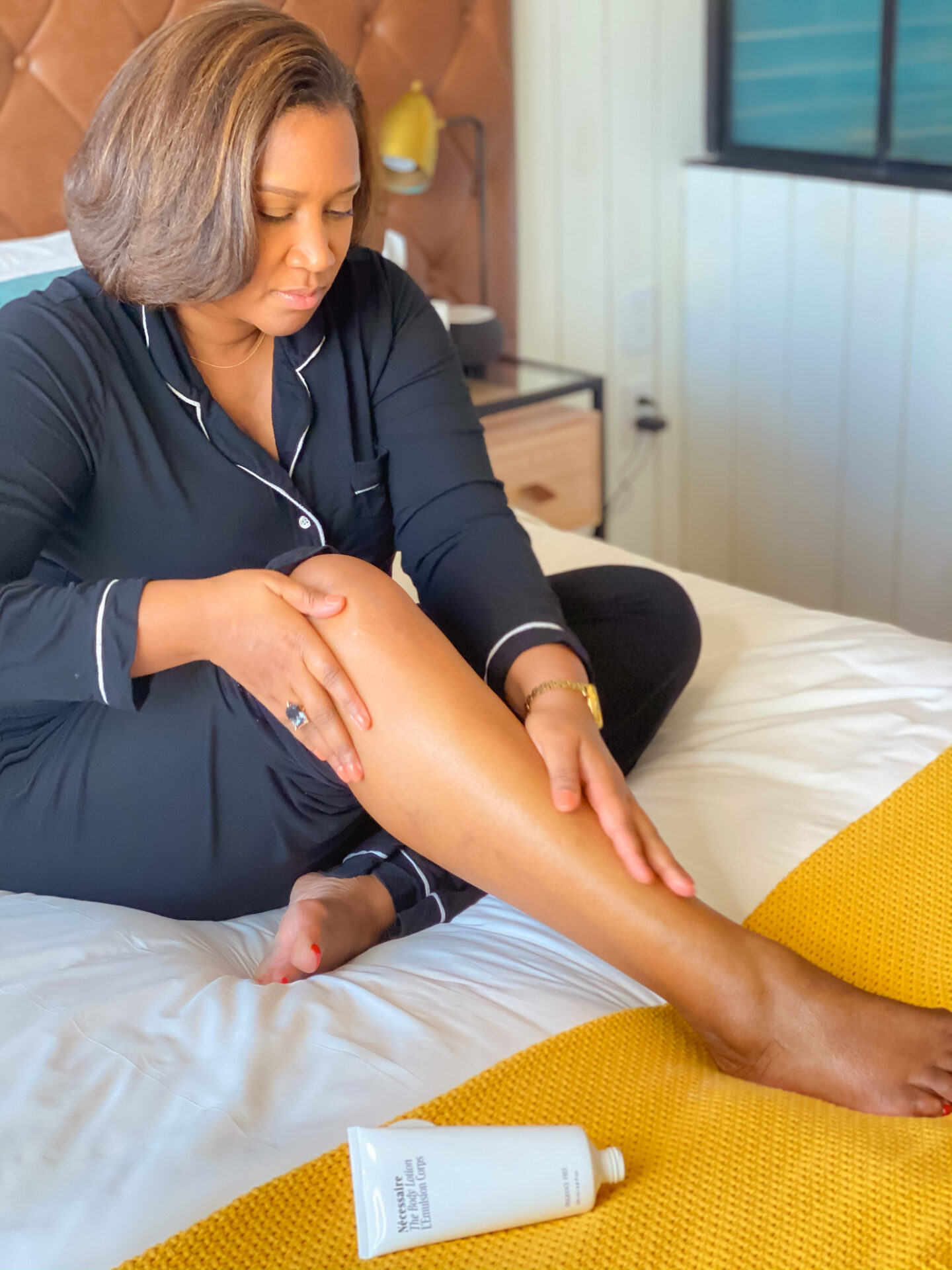
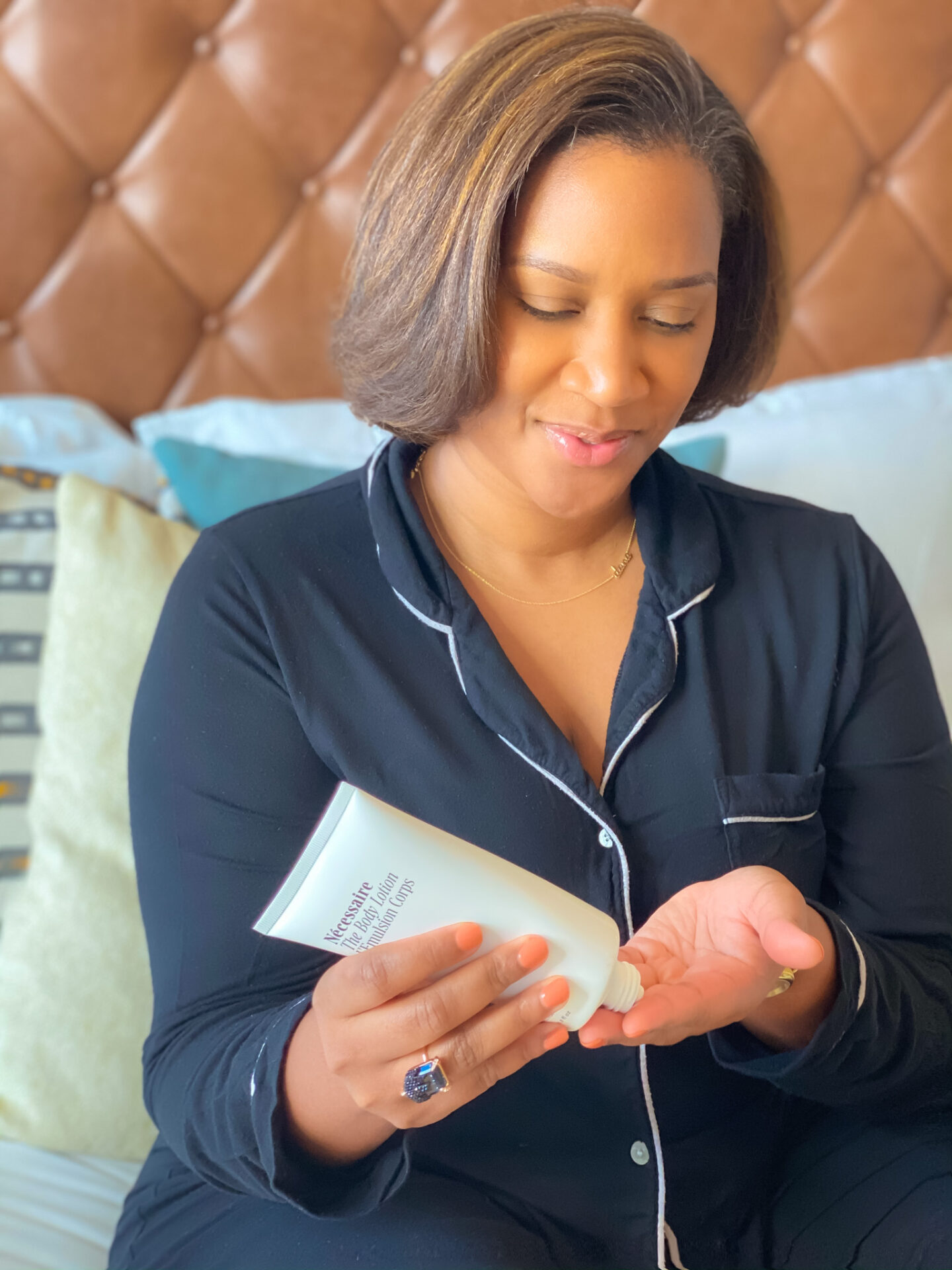
Since eczema stems from transepidermal water loss and a compromised skin barrier, your skincare routine must contain lots of hydrating and moisturizing ingredients. Look to layer skincare ingredients like:
- ANTIOXIDANTS: Antioxidants like sunscreen, niacinamide, vitamin C, vitamin E are basically free-radical fighters. Free radicals are responsible for breaking down the collagen in our skin, which plays a role in premature aging, hyperpigmentation, and triggering inflammatory conditions like eczema and acne.
- HUMECTANTS: Humectants like glycerin and hyaluronic acid are basically “water-binders.” They’re substances that attract water from their surroundings to hydrate. Given this, skincare products with humectants are going to re-hydrate your skin and increase your moisture levels.
- EMOLLIENTS: Emollients like ceramides and fatty acids help smooth the surface of your skin by filling in all the cracks produced by rough, dry, and flaky skin. Emollients fill those rough, dry, and flaky spaces with fatty substances called lipids. Lipids play a crucial role in maintaining your skin barrier’s strength, keeping in moisture, keeping out dirt and impurities.
- SOOTHING PRODUCTS: When I do have skin irritation and flare-ups, here are a few non-prescription skincare products I reach for:
Tip # 5 – Oils are your friend.
Products formulated with natural oils contain omega fatty acids. Fatty acids are also known as lipids, and they’re significant when it comes to maintaining a strong, healthy skin barrier. This is another reason I love oil cleansers when double cleansing and in my body products.
HERE ARE A FEW FACE OIL RECOMMENDATIONS:
Tip #6 – Avoid common irritants.
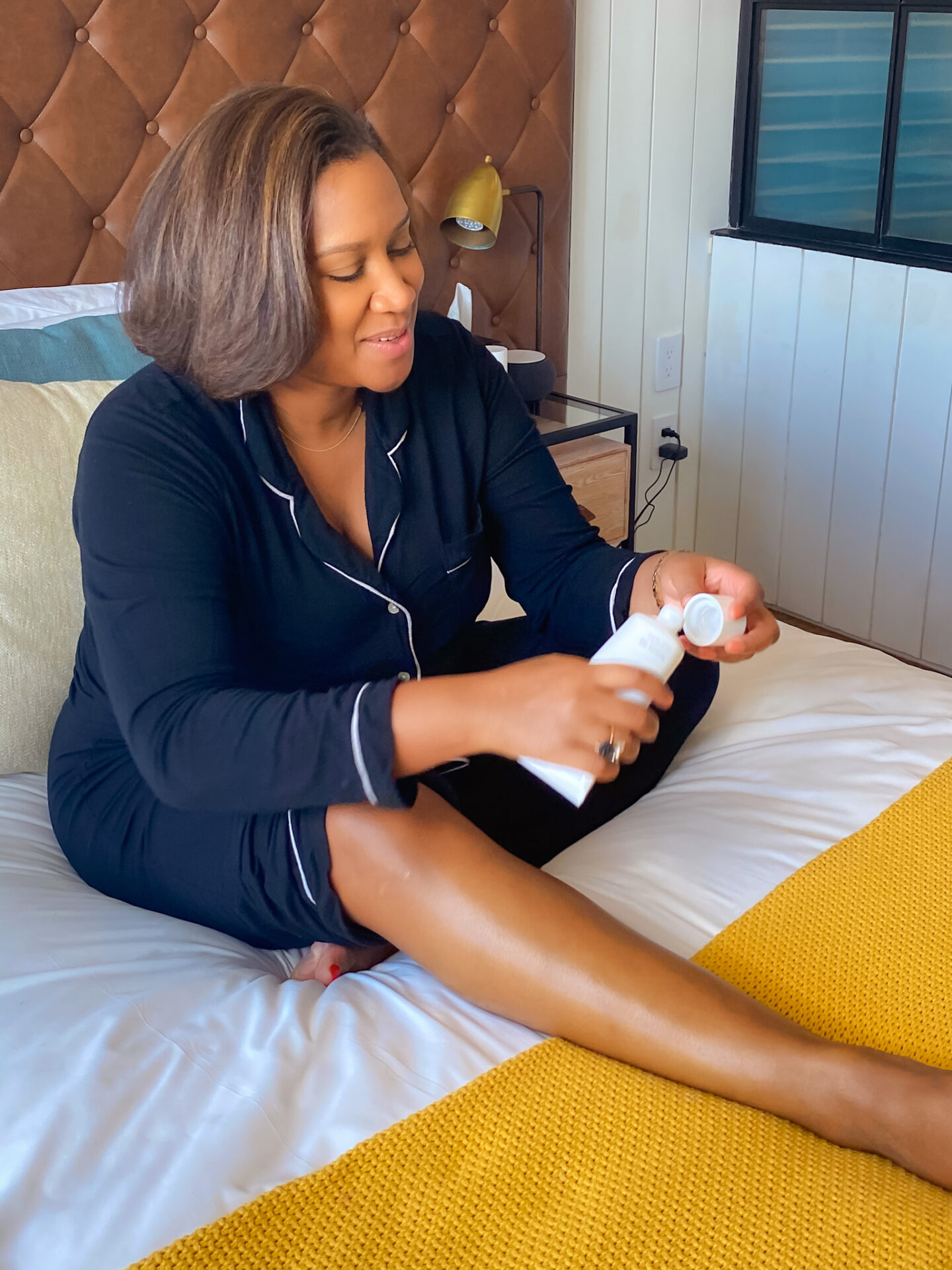
Many brands claim to be “dermatologist-tested,” “hypoallergenic,” or marketed toward sensitive skin, but that shouldn’t be enough to earn your trust.
Suppose you’re following most of these tips, but you still experience skin irritation from your winter eczema. Then, you should look to see if other common irritants are affecting your skin.
Fragrance, essential oils, simple alcohols, sulfates can be irritating in your skincare regardless of whether they’re made in a lab or derived from natural plant oils.
Choose your laundry detergent wisely as well. Opt for fragrance-free and dye-free laundry detergents. And reduce how much you dry clean your clothes since the chemicals used can trigger an eczema flare-up.
Tip #7 – Know when to get professional help.
When all else fails, it’s important to seek professional advice. I would recommend going to see a dermatologist when you have persistent skin irritation and rashes. They can prescribe topical prescription medications that are anti-inflammatory and heal eczema patches. I also make sure to get regular skin cancer screenings now.
Check out ” target=”_blank” rel=”noreferrer noopener”>my conversation with dermatologist Dr. Michelle Henry, where we discuss when you should see a dermatologist, skin cancer screenings, and cosmetic procedures.
Do you have eczema?
If so, what has helped your skin in the winter?

DID YOU LIKE THIS POST? PIN IT!

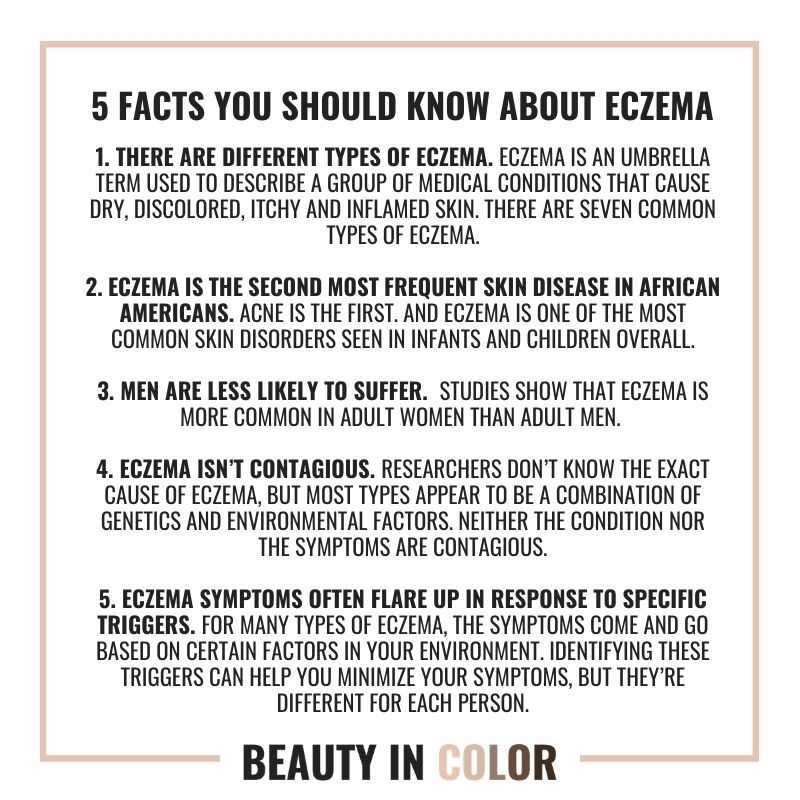
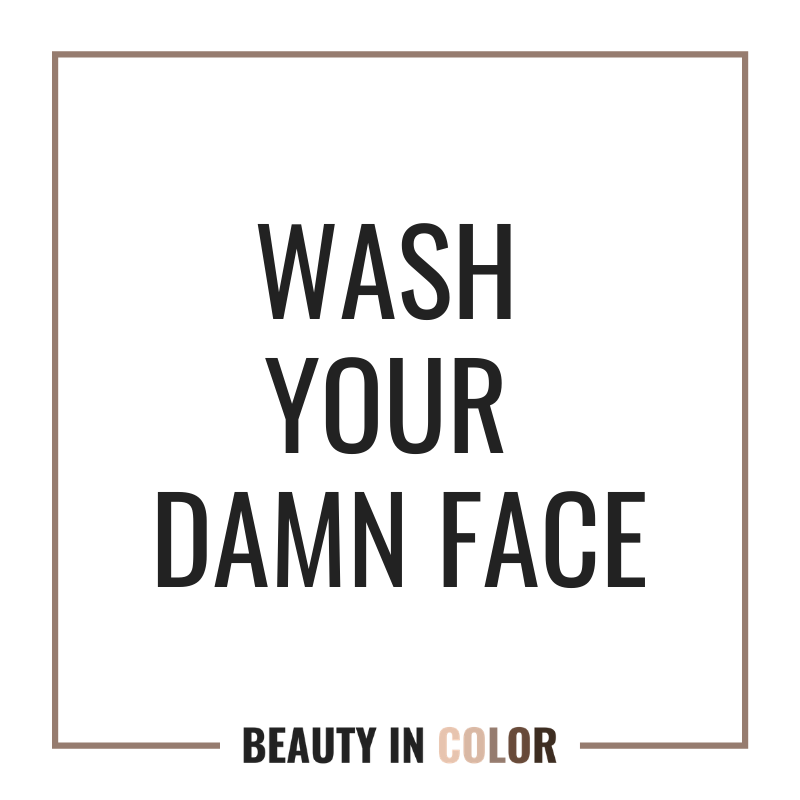
[…] I don’t believe you can prevent breakouts, but I have some tips for reducing flare-ups here. […]